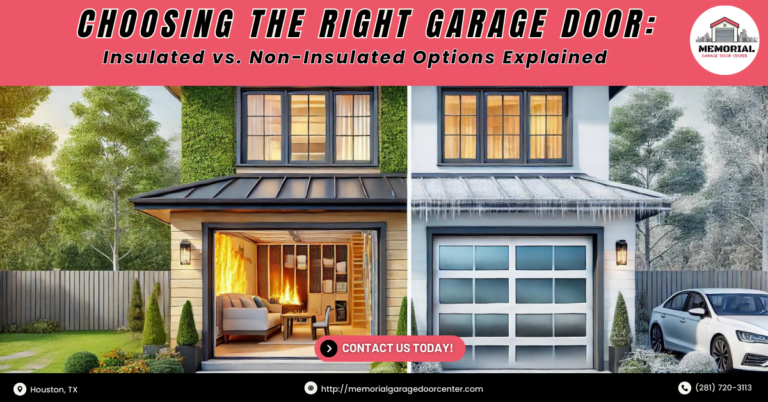Choosing the Right Garage Door: Insulated vs. Non-Insulated Options Explained
Discover the pros and cons of insulated vs. non-insulated garage doors. Learn which is best for your needs with Memorial Garage Door Center, serving Houston, TX.

When it comes to garage doors, making the right choice can feel like navigating a maze. Should you go for an insulated garage door or stick with a non-insulated one? This decision impacts everything from your home’s energy efficiency to the noise level in your garage. Let’s dive into the world of garage doors and make sense of these options together!
The Basics: What’s the Difference?
Insulated Garage Doors
Insulated garage doors come with layers of insulation material, usually polystyrene or polyurethane, sandwiched between steel or aluminum panels. This design not only strengthens the door but also significantly enhances energy efficiency. The insulation helps maintain a more consistent temperature in your garage, which can be particularly beneficial if your garage is attached to your home or used as a living space.
Moreover, insulated doors often have a more solid and robust feel compared to their non-insulated counterparts. This sturdiness can translate to better resistance against dents and damage, ensuring that your garage door remains in good condition for a longer period.
Non-Insulated Garage Doors
Non-insulated garage doors are typically a single layer of steel or aluminum. They are the more basic, entry-level option in the world of garage doors. While they serve the fundamental purpose of protecting your garage from the elements and providing a secure barrier, they lack the additional benefits offered by insulated doors.
These doors are lighter, which can be an advantage if your garage door opener is not very powerful or if you have to operate the door manually. However, the lack of insulation means that non-insulated doors can become quite noisy, and they don’t offer much in the way of temperature control.
Why Should You Care About Insulation?
Energy Efficiency
In Houston’s sizzling summers and chilly winters, an insulated garage door can make a huge difference in your home’s overall energy use. By keeping the garage temperature more stable, your HVAC system doesn’t have to work as hard, saving you money on energy bills. Who doesn’t love a little extra cash in their pocket?
With an insulated garage door, your home’s thermal envelope is more intact. This means less heat escapes in the winter and less heat infiltrates during the summer, leading to more comfortable living spaces adjacent to or above the garage.
Noise Reduction
If you use your garage as a workspace, gym, or even an entertainment area, you’ll appreciate the quieter environment that an insulated garage door provides. It helps muffle the noise from both outside and inside the garage. Imagine having a peaceful home office without the distraction of noisy neighbors or street sounds!
The insulation acts as a sound barrier, dampening vibrations and reducing the transmission of noise. This can be particularly beneficial if your garage is close to living spaces or if you live in a noisy neighborhood.
Durability
Insulated garage doors tend to be more robust due to their multi-layer construction. This added strength means they can withstand the occasional bump from a car or a basketball game gone wrong.
The additional layers of material provide more structural integrity, making the door less prone to dents and dings. This durability not only extends the lifespan of the door but also maintains its aesthetic appeal over time.
Frequently Asked Questions
How much more does an insulated garage door cost?
Insulated garage doors are generally more expensive upfront than non-insulated ones. However, the long-term savings on energy bills and the added durability often make them a worthwhile investment.
The initial cost difference can vary depending on the type and thickness of the insulation, as well as the overall design and material of the door. However, considering the energy savings and the potential increase in home value, many homeowners find that insulated doors are worth the extra cost.
Can I convert my existing non-insulated garage door to an insulated one?
While it’s technically possible to add insulation to a non-insulated door, it’s usually more cost-effective and efficient to replace the door with an insulated model. Plus, you get the benefits of a brand-new door!
Retrofitting insulation can be a complex and labor-intensive process, often requiring professional installation to ensure proper fit and performance. It’s generally easier and more effective to install a new insulated door designed to meet your specific needs.
Where Does It Matter Most?
For homeowners, especially those who use their garage for more than just parking, an insulated garage door is a great choice. It keeps the space comfortable and usable year-round. On the other hand, for commercial properties where the garage is strictly for storage, a non-insulated door might suffice.
Residential garages often serve multiple purposes, from workshops and gyms to additional living spaces. Insulated doors enhance comfort and usability in these scenarios. In contrast, commercial garages that are used primarily for storage or as loading docks may not require the additional benefits of insulation.
How to Decide: Ask Yourself This
Do you use your garage as a living space or for activities? Do you live in a climate with extreme temperatures? Are you looking to save on energy costs? If you answered yes to any of these questions, an insulated garage door is likely the best choice for you.
Consider your specific needs and how your garage is used. If it’s a multifunctional space, the benefits of insulation will likely outweigh the additional cost. If it’s primarily for parking and storage, a non-insulated door might be sufficient.
Conclusion
Choosing between an insulated and a non-insulated garage door ultimately comes down to your specific needs and priorities. If energy efficiency, noise reduction, and durability are important to you, an insulated garage door is a smart investment. However, if your garage is purely for storage, a non-insulated door might be all you need.
At Memorial Garage Door Center, we’re here to help you make the best choice for your home or business. Whether you need a garage door replacement, garage door repair in Houston, TX, or an emergency garage door repair, our team has got you covered. We proudly serve all of Houston, from the bustling Downtown to the serene spaces near the Houston Arboretum & Nature Center.
Ready to upgrade your garage door? Contact Memorial Garage Door Center today and let’s find the perfect solution for you!
